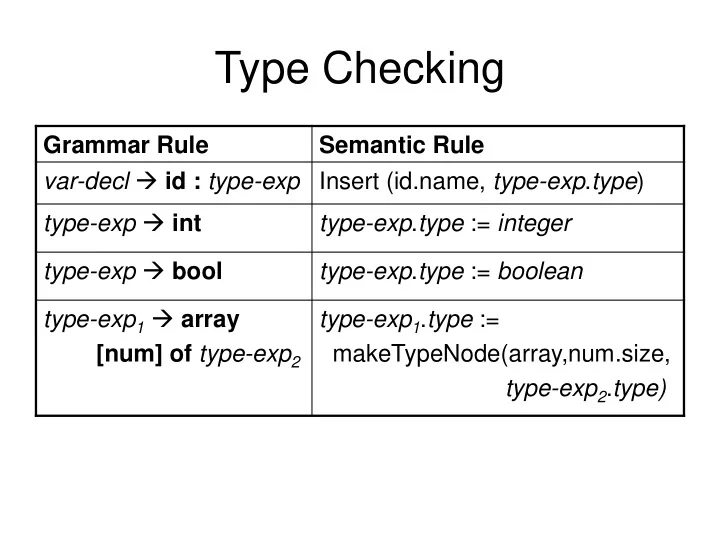

Type Checking Grammar Rule Semantic Rule var-decl id : type-exp Insert (id.name, type-exp . type ) type-exp int type-exp . type := integer type-exp bool type-exp . type := boolean type-exp 1 array type-exp 1 . type := [num] of type-exp 2 makeTypeNode(array,num.size, type-exp 2 . type)
Type Checking Grammar Rule Semantic Rule stmt if exp then stmt If not typeEqual ( exp.type , boolean ) then type-error(stmt) stmt id := exp If not typeEqual (lookup(id.name), exp.type ) then type-error(stmt) exp 1 exp 2 + term If not typeEqual ( exp 2 .type , integer) and typeEqual ( term.type , integer) then type-error(stmt); exp 1 .type := integer exp term exp.type = term.type
Type Checking Grammar Rule Semantic Rule exp 1 exp 2 or exp 3 If not typeEqual ( exp 2 .type , boolean ) and typeEqual ( exp 3 .type , boolean ) then type-error(exp 1 ); exp 1 .type := boolean exp 1 exp 2 [ exp 3 ] If isArray ( exp 2 .type ) and typeEqual ( exp 3 .type , integer ) then exp 1 .type := exp 2 .type.child else type-error(exp 1 );
Type Checking Grammar Rule Semantic Rule exp num exp.type := integer exp true exp.type := boolean exp false exp.type := boolean exp id exp.type := get_type ( id . name)
Var. Declaration Imp. Example Procedure var-decl ( ) Procedure type-exp ( string t) Begin Begin match ( id) ; match (‘:’); Case token of type-exp (ts ); “integer”: begin match (“integer”); create( id.name, ts); t= “integer”; end End “Bool:”: begin match “bool”; t=“Bool”; end Else syntax_err( ); End
Type Declaration C++ Implementation Example void var_decl ( ) { string ts; // Added for implementation purpose token = scan (); string idst r= tokenstring; match (ID); match (COL); type_exp (ts ); // ts is a synthesized attribute for type_exp ST.create_entry(idstr,ts); // semantic action }
Type Checking Imp. Example void expr(string &exp_typ, int &val) { //Declare local variable that will be used as parameters ("type" synthesized attributes) of the term function string left_type, right_type; //Declare local variable that will be used as parameters ("val" synthesized attributes) of the term function int left_val, right_val; // The BNF of expr is converted to EBNF to avoid the left recursion term (left_type, left_val); //term() will return type and value of term // This loop is the check the types of the operands and evaluate the expression while (token == PLUS) { match(PLUS); term(right_type, right_val); // Check left and right operands types if (right_type != left_type) semantic_err("Operand are not the same type"); // Compute the left and right operands and put the results in the variable left_val used to accumulate the results left_val = left_val + right_val; }; exp_typ = left_type; val= left_val; }
Recommend
More recommend